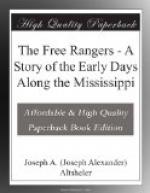The fleet resumed its passage up the river in its usual arrow formation, with the five near the tip of the barb, but the bright promise of the morning was deceitful. Toward noon the clouds of the night before that had not retreated far, came back again, filing solemnly across the sky in a long, somber procession. No air stirred. The wide, yellow river stretched before them, a smooth, molten surface.
The motion of the fleet became perceptibly slower. The men in that turgid atmosphere felt languid and inert, and their hands rested but lightly on oar and paddle. Cheerfulness gave way to depression. The voyage was far less easy than it had seemed a few hours before. Overhead the clouds united and drew a leaden blanket from horizon to horizon.
“It’s a storm, of course,” said Henry. “Remember the one that struck us when we were coming down the river. It’s just such another.”
There was a sudden rush of hot air. Dull thunder, singularly uncanny in its low, distant note, began to grumble. Lightning of an intense coppery color flashed again and again across the heavens. The river began to rise in yellow waves that crumbled and rose again.
Some of the boats had sails, but these were quickly taken in—Adam Colfax was no careless seaman. The fleet, nevertheless, began to heave on the troubled water, break its formation, and fall into imminent danger of frequent collision. The great river, usually so friendly, and, like a long cord, uniting the green lands on either side, was now full of wrath and fury. Burst after burst of wind, screaming ominously, swept over it, and the waves rolled like those of the sea. Despite powerful hands on oar and paddle, the fleet was driven about like a covey of frightened birds. Meanwhile, the darkness increased until it was almost like night.
Adam Colfax struggled hard. He wished to keep to the middle of the river, and a single boat might have fought out the storm there, but the danger was steadily increasing. Two boats, already, were in collision, and with great difficulty were saved from sinking.
“We’ll have to make for the shore and tie up,” he shouted to Henry, who was in the boat next to him. “I think it’s the most violent storm I ever saw on the Mississippi.”
“We may find a sheltered place,” Henry shouted back above the roar of the wind.
“There’s nothing else to do,” said Adam Colfax. “The eastern shore looks the lower, and we’ll go for it at once.”
He gave the signal with hand and voice, and all the boats began to pull with their whole strength in a diagonal course toward the east bank, while the wind shrieked in gust after gust, the thunder crashed incessantly, and the coppery lightning flared in great saber-cuts across the sky.




